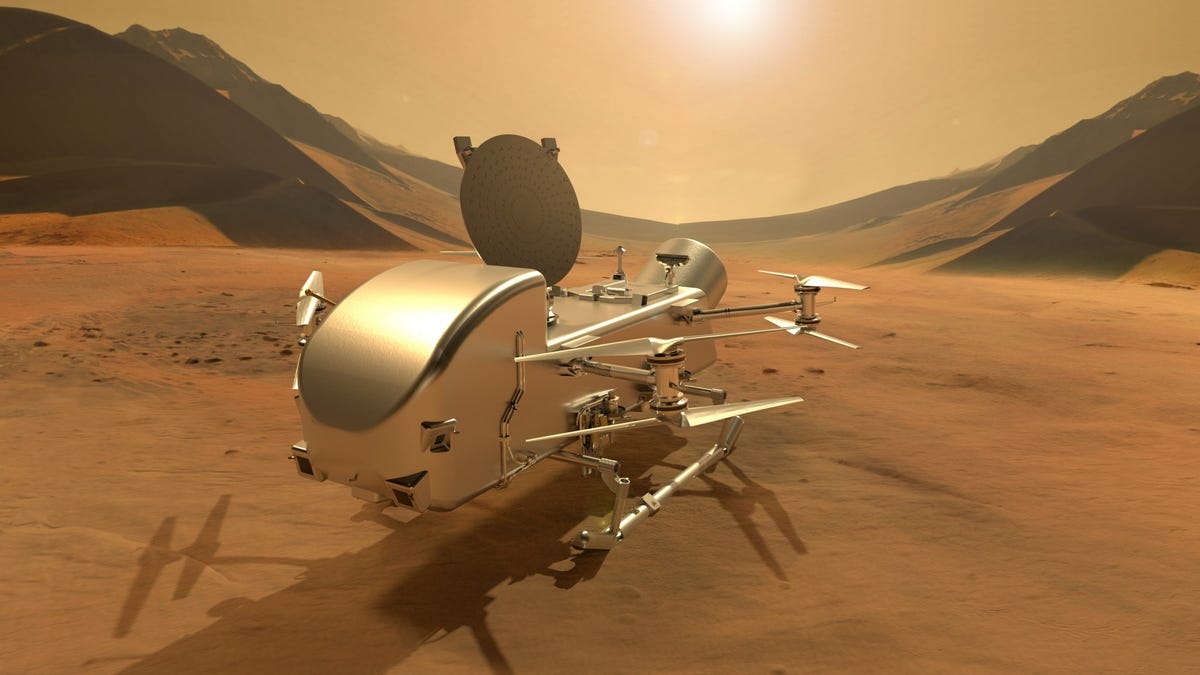
NASA has announced a delay in its ambitious Dragonfly mission to Saturn’s moon Titan, moving the launch date to July 2028. This decision, driven by budget uncertainties, comes despite the mission successfully passing key design reviews. Worryingly, the space agency is delaying formal confirmation of the mission until a budget review in mid-2024.
The ambitious Dragonfly mission, proposed in 2017 and selected in 2019 for NASA’s New Frontiers program, is no stranger to delays. Initially planned for a 2026 launch, it was first pushed to 2027 due to external budget pressures, and now, amid current fiscal challenges, it won’t launch until 2028. Dragonfly, a ground-breaking planetary exploration project using a rotorcraft-lander, aims to study Titan’s environment and potential for life. Given the delay, Dragonfly won’t land on Titan any earlier than 2035.
Advertisement
The delay of the mission is due to uncertain and changing funding for NASA’s planetary science division. The agency’s 2024 budget request for planetary science sits at $3.38 billion, but proposed allocations in House and Senate bills hint at potential reductions, affecting Dragonfly and other missions, according to SpaceNews.
Advertisement
Lori Glaze, director of NASA’s planetary science division, expressed concerns at a recent meeting of NASA’s Outer Planets Assessment Group (OPAG). As reported in Space Policy Online, she highlighted the difficulty of confirming missions without a clear budget outlook. “How do we confirm a mission if we don’t quite know what the budget horizon looks like?” Glaze said, emphasizing the need for an “executable budget profile” for Dragonfly.
Advertisement
Glaze did not provide a cost estimate for the mission, but admitted that it’s exceeding initial expectations, Space Policy Online reported. As the mission’s costs rise, chatter is emerging about possibly reclassifying Dragonfly as a flagship mission (i.e. $1 billion or more), a category that includes NASA’s most expensive and complex projects like the Mars Perseverance rover and the James Webb Space Telescope. Glaze admitted that the cost has gone up because of delays and other reasons, stating, “The bottom line is it’s a very complicated and complex mixture of issues that have resulted in a higher cost for Dragonfly than what was originally planned.”
Advertisement
Despite these financial hurdles, the Dragonfly team has made significant progress. As announced in a NASA press release, the mission passed all success criteria of its Preliminary Design Review earlier this year. Accordingly, the space agency has authorized the mission to proceed with its final design and fabrication, known as Phase C, in 2024. That said, the agency is postponing formal confirmation of the mission, including its total cost and schedule, until mid-2024, following the release of the 2025 President’s budget request. Mission confirmation is typically granted at this stage, so this is a bit upsetting and worrisome.
Indeed, it would be a real shame if this mission isn’t allowed to proceed. Dragonfly, designed as a dual-quadcopter, presents an exciting chance to investigate Titan’s unique environment. Titan is notable for its thick atmosphere and the presence of surface liquids, although these are mainly composed of methane. The mission seeks to investigate the moon’s habitability, the progression of prebiotic chemistry, and the possibility of past life, either water-based or hydrocarbon-based.
Related article: NASA Plans to Visit a Toxic Moon—Here’s How It’s Testing a ‘Dragonfly’ for the Mission
It will be the first time a rotorcraft-lander (unlike the Ingenuity helicopter on Mars, which is not a lander) is used for planetary exploration. In the NASA press release, Nicola Fox, associate administrator of NASA’s Science Mission Directorate, praised the team for overcoming technical and programmatic challenges, saying, “I am proud of this team and their ability to keep all aspects of the mission moving toward confirmation.”
Advertisement
Dragonfly is not the only NASA mission to be hindered by budget constraints. The Mars Sample Return mission is currently on pause, pending further reviews, and the VERITAS mission to Venus has experienced a “soft cancellation” due to similar financial challenges. These developments highlight the impact of budgetary limitations on NASA’s ambitious space exploration projects.
For more spaceflight in your life, follow us on X (formerly Twitter) and bookmark Gizmodo’s dedicated Spaceflight page.
Services Marketplace – Listings, Bookings & Reviews